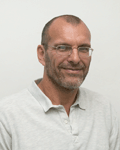Q & A with Marc Ingelbrecht, Oxfam International Regional Representative for the Caribbean and Chief of Risk Reduction Management in Cuba


Oxfam International is a confederation of organizations made up of a baker’s dozen institutions that work diligently with more than 3,000 local entities from 100 countries. Their main projects are aimed at finding definitive solutions to slash poverty, social suffering and injustice. Quite recently, Oxfam International teamed up with the Excelencias Group to organize a workshop on risk reduction management in Cuba’s eastern province of Holguin. The organization’s regional representative for the Caribbean, Marc Ingelbrecht, -stationed in Cuba- talked exclusively with Caribbean News Digital about the event’s outcomes and major achievements.
Q.- As an NGO headquartered in Belgium and taking into account that those thirteen organizations you work with are from Europe or the rest of the developed world, how does Oxfam International come up with proper solutions to do away with poverty and social injustice in countries that have different economic and social conditions to those in Europe and the U.S?
A.- Oxfam International has indeed 13 organizations to work with. A considerable chunk of them are based in Europe, and there are other in the U.S., Canada, Australia and Hong Kong, in addition to others in Ireland, UK, France, Germany, Netherlands, Belgium and Spain. We’ve been working together for a number of years in staving off poverty and on a quest to have a fairer world for all.
We deal with a number of development projects whereby we try to come up with sustainable ways for different organizations around the world we work with. We also work with the communities in finding solutions to their problems. However, we focus on solutions other than providing response levels. We’re homing in more on prevention and solutions of conflicts, avoiding wars rather than waiting for them to happen.
With this view in mind, Oxfam International’s main challenges have to do with our working with our counterparts in the target countries. We always try not to be the providers of development projects or the managers of risk reduction. Instead, we support our counterparts in each and every country in pinpointing the vulnerabilities of the populations in the face of natural disasters, underdevelopment, social injustice or conflicts.
Q.- Can you mention some of the campaigns Oxfam International has worked on and the results of those efforts?
A.- There’s a particular campaign that came to a close two years ago and had to do with access to education for both children and adults. We worked on the right to learn how to read and write. This campaign was marked by making authorities aware of the need to give the people the right to learn to read and write. I must say that this campaign helped make a dent in illiteracy –a scourge that has dwindled significantly around the world over the past ten years or so. Now States are more aware of their responsibility to slash illiteracy everywhere.
There was a time when governments didn’t abide by their responsibilities in this respect and as a result Oxfam International and other NGOs had to bear the brunt of launching nationwide literacy campaigns in many countries. There was also a time when many around the globe thought NGOs were substitutes of the States, but this approach has changed now. NGOs are now construed as organizations that get the job done in those fields in which the governments can’t make it due to a number of reasons. Yet no one can take any responsibility from the States.
Q.- Did these campaigns you’ve mentioned have a global scope?
A.- Absolutely. Those were campaigns we launched all around the world.
Q.- The Association of Caribbean States (ACS) is now paying a lot of heed to the prevention of disasters and risk reduction management in the region. How does Oxfam International operate with the Caribbean and Cuba?
A.- Oxfam International works with peer NGOs in the Caribbean region. Cuba is a different case because our counterpart on the island nation is the Civil Defense System. Cuba has a longstanding tradition, experience and expertise in risk and disaster management. The layout of Cuba’s civil defense system in terms of risk management, prevention of disasters, early alerts and research that can be perfectly applied in other nations or can be very useful in other countries. At the level of municipalities, provinces and the entire nation, Cuba boasts results and skills that could work anywhere else in Central America and the Caribbean.
The workshop we’ve just wrapped up in Cuba’s Holguin had the objective of gathering people from different decision-making levels. The event was attended by delegates and representatives from local civil defense agencies and people in charge of risk management and disaster prevention in municipalities and NGOs from Central America, Haiti and the Dominican Republic. They were willing to learn right on the spot how those systems actually work in Cuba.
There was a theoretical part and a second part devoted to visiting neighboring municipalities. Attendants had the opportunity of watching evacuation trials that were performed with little resources, yet lives and means were adequately protected. The bottom line is that good planning and proper program designing –coupled with political willingness- are good enough to save lives.
Q.- Is this the first workshop Oxfam International has ever carried out?
A.- No, we had organized a similar event in Cienfuegos (Cuba) four years ago.
Q.- Any major increases in turnout, I mean, when comparing the event in Cienfuegos four years ago and the one held in Holguin last month?
A.- Oh, yes, because to the event in Cienfuegos only delegates from Central America attended. There were no representatives from the Caribbean and there were no Cuban delegates either. In the Holguin event this year, we had 30 representatives from Cuba and 30 from Central America and the Caribbean. This time around the exchange of information and ideas was far deeper, no doubt about that.
Q.- How did the Excelencias Group, through its foundation and travel agency, help Oxfam organize and plan this event?
A.- The Excelencias Group, through the foundation and the travel agency, guaranteed in a very efficient way the logistics of the event, including international and national transportation. The company made a superb effort in a time of year when Cuba’s receiving a major inflow of tourists from overseas, yet the Excelencias Group guaranteed flights for 30 people from Havana to Holguin, let alone accommodations, meals and everything else.
Indeed, Excelencias’ efforts were a relief to us because Oxfam didn’t have to deal with the logistics of the event. That gave us the possibility of focusing on the contents of the workshop, something that didn’t happen four years ago in Cienfuegos.
Q.- Given the increasing interest among Caribbean governments in dealing head-on with risk management and disaster prevention, does Oxfam have ties with the Association of Caribbean States to work together in this sense?
A.- No, it doesn’t. I believe Oxfam is closer to Central America than to the Caribbean. It’s true we’re beginning to see some ongoing efforts on the part of Caribbean nations in terms of risk management and the prevention of natural disasters, however Oxfam is only present in three Caribbean nations –Haiti, the Dominican Republic and Cuba.














